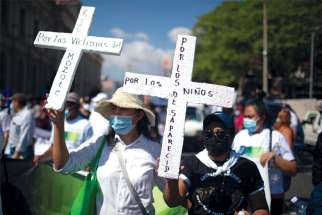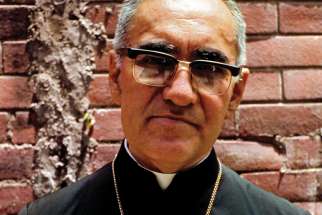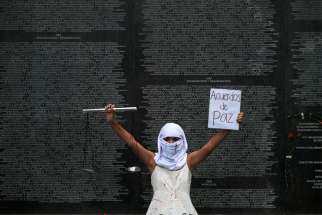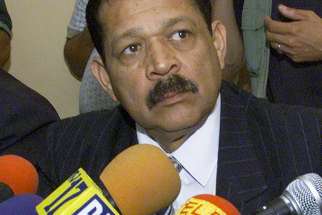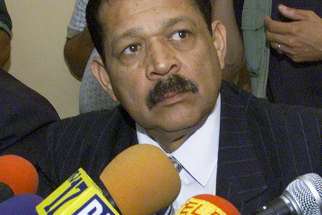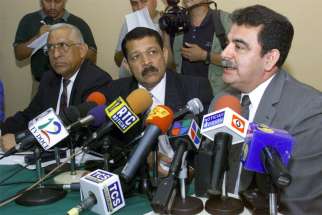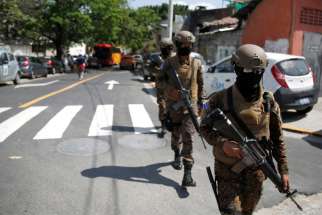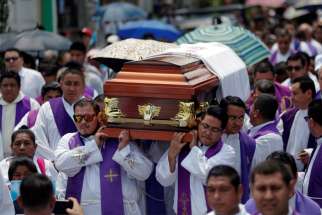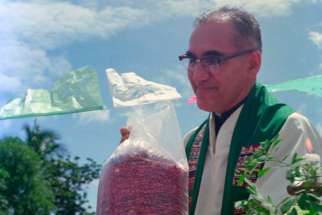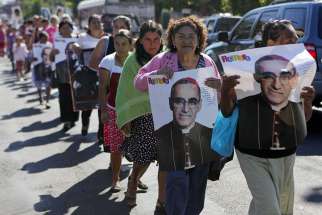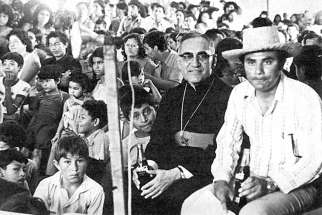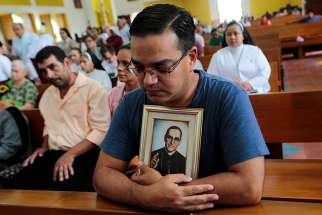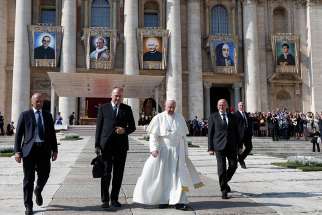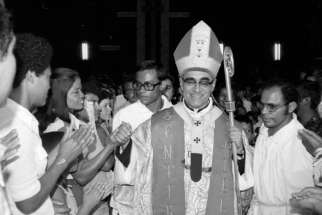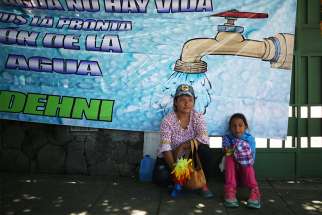El Salvador marks 30 years of peace
SAN SALVADOR, El Salvador -- Feliz Maria Guardado walked near a ledge close to her home in the village of Los Calles Jan. 15 and pointed to a dirt road where townsfolk say they saw her brother, who couldn’t walk, dragged to his death by soldiers in 1982.
That same year, two years into a civil war in El Salvador, her elderly father fell to his death as the family began running from soldiers, looking for a place to hide in the mountains nearby. The patriarch lost his footing on a curb and fell off a mountain.
“We suffered great torment,” Guardado, now in her 70s, told Catholic News Service Jan. 15. “If we didn’t run, they would have killed us all.”
The following day she celebrated the 30th anniversary of the signing of peace accords. The accords — signed Jan. 16, 1992 — put an end to 12 years of civil war that left tens of thousands of civilians dead, including the country’s martyred St. Oscar Romero and four Salvadoran Catholics who will be beatified Jan. 22.
Guardado said that, encouraged by her local bishop to give thanks for the big and small things about not living in a war, she wanted to celebrate not having to run for her life any more.
“It’s great joy,” she told CNS. “Immense joy. No more war. We don’t want war.”
While those who lived through the conflict like Guardado were marking the day, Salvadoran President Nayib Bukele and the ruling Nuevas Ideas party in Congress, which he founded, said they would not observe the milestone.
“Far from representing a benefit for the Salvadoran people, they (the peace accords) constituted the beginning of an era of corruption,” the majority of the Salvadoran general assembly said in a decree, adding they would celebrate instead “a day for the victims of the conflict.”
Though peace seems to be elusive for El Salvador, which has suffered from rampant gang violence following the war, the accords put an end to the kind of violence the 1970s and 1980s generated based on political differences. Back then, conflict between left-leaning rebels and a right-wing government produced death squads as well as guerrilla armies, whose encounters terrorized civilians like Guardado. If either group suspected a civilian’s involvement with the other, death soon would follow.
The accords, aside from forcing armed groups to put down their weapons, also changed the role of the military, which had taken part in atrocities ordered by those in power, and instead reimagined a new role for it as an institution to protect the populace, not harm it. The accords also established a national office to handle human rights violations and instituted a multiparty system, opening the way to a fledging democracy for El Salvador.
Today, some see all of that in peril. Seeming to align with China, which has set its strategic eye on Central America, the president seems to be is stepping away from friendly relations with the U.S.
Some of the rancor comes from the U.S. calling out officials in Bukele’s government for corruption. Bukele, in turn, has accused the U.S. government of paying his opponents to fuel opposition.
El Salvador turns to Romero in difficult time
SAN SALVADOR, El Salvador -- COVID-19 put a damper on last year’s celebrations to mark the 40th anniversary of St. Oscar Romero’s martyrdom, but a continuing pandemic couldn’t stop this year’s festivities.
Cardinal: 'devil is running loose' in El Salvador
CHALATENANGO, El Salvador -- Cardinal Gregorio Rosa Chávez asked the country to pray "for liberation from Satan" Feb. 1 after violence erupted following a political rally late Jan. 31 in the capital, San Salvador.
Thirty-one years later, ‘vindication’ for murder victims
VATICAN CITY -- The September conviction of a former Salvadoran colonel for the murder of five Spanish Jesuit priests during El Salvador’s civil war is a major step forward on the path to gaining justice and healing old wounds, Canadian Cardinal Michael Czerny said.
MEXICO CITY -- Inocente Orlando Montano, the former Salvadoran army colonel accused of participating in "the decision, design or execution of the killings" of six Jesuits in 1989, testified in his Spanish trial that no order was ever given to eliminate the priests.
MEXICO CITY -- A former Salvadoran army officer has testified that the "high command" gave orders to eliminate Jesuits priests during the country's civil war. He also said the Central American country's president would have known of the crimes to be committed and did not intervene.
Salvadoran cardinal calls for prudence, patience amid political turmoil
MEXICO CITY -- A Salvador cardinal urged "prudence" from the politicians in the Central American country as the president pushed congress to approve a package of security spending.
WASHINGTON -- A 34-year-old sacristan is in the custody of Salvadoran authorities in connection with the May killing of a Salvadoran priest.
Salvadoran human rights office pushes courts to prosecute St. Oscar Romero assassin
Salvadoran archbishop asks Pope to make Romero first Latin American 'doctor of the church'
Canada’s Salvadoran community unites to celebrate Romero
It’s a nine-hour flight from Toronto to Vatican City. It’s seven hours by jet to El Salvador. But Msgr. Oscar Romero’s canonization on Oct. 14 will not be a distant event for many Catholics.


